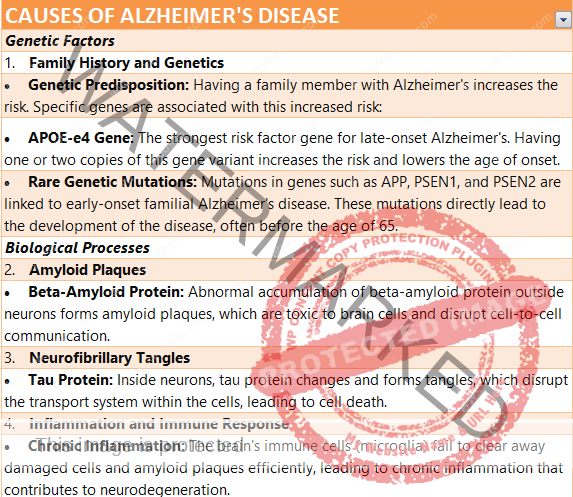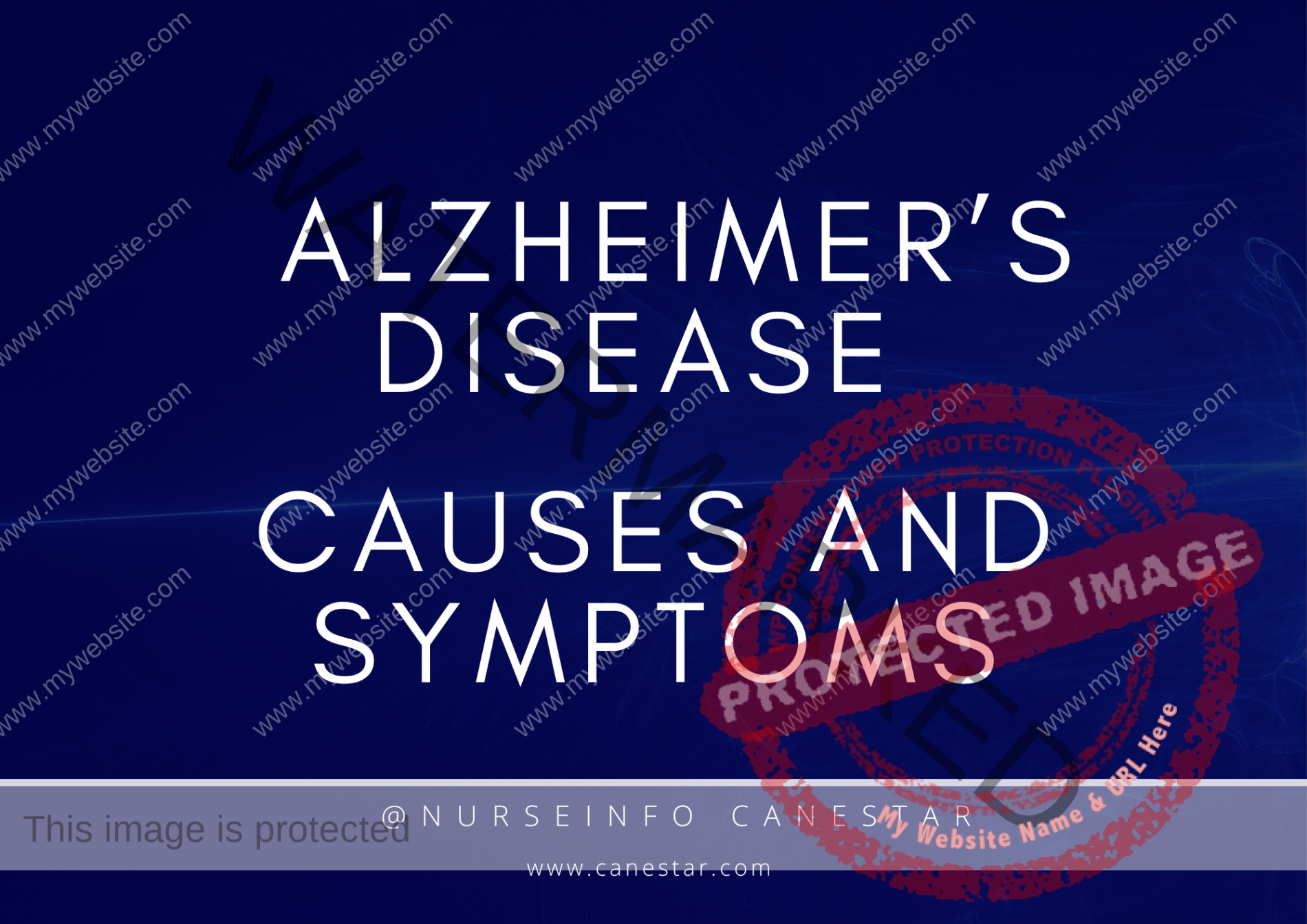Alzheimer’s Disease Causes and Symptoms
Causes of Alzheimer’s Disease
Alzheimer’s disease is a complex and multifactorial condition, meaning its exact cause is not fully understood and is likely due to a combination of genetic, environmental, and lifestyle factors.
Here are the primary factors believed to contribute to the development of Alzheimer’s disease:
Genetic Factors
Family History and Genetics
Genetic Predisposition: Having a family member with Alzheimer’s increases the risk. Specific genes are associated with this increased risk:
APOE-e4 Gene: The strongest risk factor gene for late-onset Alzheimer’s. Having one or two copies of this gene variant increases the risk and lowers the age of onset.
Rare Genetic Mutations: Mutations in genes such as APP, PSEN1, and PSEN2 are linked to early-onset familial Alzheimer’s disease. These mutations directly lead to the development of the disease, often before the age of 65.
Biological Processes
- Amyloid Plaques
- Beta-Amyloid Protein: Abnormal accumulation of beta-amyloid protein outside neurons forms amyloid plaques, which are toxic to brain cells and disrupt cell-to-cell communication.
- Neurofibrillary Tangles
- Tau Protein: Inside neurons, tau protein changes and forms tangles, which disrupt the transport system within the cells, leading to cell death.
- Inflammation and Immune Response
- Chronic Inflammation: The brain’s immune cells (microglia) fail to clear away damaged cells and amyloid plaques efficiently, leading to chronic inflammation that contributes to neurodegeneration.
- Vascular Contributions
- Blood Flow Issues: Reduced blood flow and vascular health in the brain can contribute to the development of Alzheimer’s by depriving neurons of necessary oxygen and nutrients.
Environmental and Lifestyle Factors
- Age
- Primary Risk Factor: The most significant known risk factor. The risk increases significantly after the age of 65.
- Cardiovascular Health
- Heart Health: Factors such as hypertension, diabetes, high cholesterol, and obesity can increase the risk by damaging the heart and blood vessels, which in turn affects brain health.
- Head Trauma
- Traumatic Brain Injury: Severe or repeated head injuries increase the risk of developing Alzheimer’s disease later in life.
- Lifestyle and Diet
- Healthy Lifestyle: Diets rich in fruits, vegetables, whole grains, and lean proteins (such as the Mediterranean diet) are associated with a lower risk.
- Physical Activity: Regular exercise promotes cardiovascular and brain health, potentially reducing the risk.
- Mental and Social Activity: Engaging in mentally stimulating activities and maintaining social connections may help protect against Alzheimer’s.
- Education and Cognitive Reserve
- Higher Education and Lifelong Learning: A higher level of education and engaging in intellectually stimulating activities throughout life are associated with a lower risk, possibly due to a greater cognitive reserve.
Other Potential Factors
- Sleep Disorders
- Sleep Apnea and Poor Sleep Quality: Sleep disturbances are linked to an increased risk of Alzheimer’s due to the role of sleep in clearing beta-amyloid from the brain.
- Chronic Stress and Depression
- Mental Health: Chronic stress and depression have been linked to an increased risk, possibly due to their impact on brain structure and function.
SYMPTOMS
Alzheimer’s disease is a progressive neurological disorder that affects memory, thinking, and behavior. Symptoms typically develop slowly and worsen over time, becoming severe enough to interfere with daily tasks. The symptoms can be broadly categorized into early, middle, and late stages:
Early stage symptoms, late stage symptoms and end stage symptoms
Early-Stage Symptoms
- Memory Loss: Especially of recent events, names, and places.
- Difficulty in Planning or Solving Problems: Trouble following plans, working with numbers, or handling familiar tasks.
- Confusion with Time or Place: Losing track of dates, seasons, and the passage of time.
- Misplacing Things: Placing items in unusual places and being unable to retrace steps to find them.
- Poor Judgment: Making poor decisions in social or financial situations.
- Changes in Mood and Personality: Becoming confused, suspicious, depressed, fearful, or anxious.
- Withdrawal from Work or Social Activities: Avoiding hobbies, social activities, or work projects.
Middle-Stage Symptoms
- Increased Memory Loss and Confusion: Greater difficulty recalling personal history, confusing days, and requiring assistance with daily tasks.
- Difficulty with Language: Struggling with vocabulary, finding the right word, or following and joining conversations.
- Difficulty Performing Familiar Tasks: Needing help with daily tasks such as dressing, bathing, or using the toilet.
- Changes in Sleep Patterns: Trouble sleeping or sleeping too much.
- Increased Risk of Wandering: Getting lost or wandering, often due to confusion or restlessness.
- Behavioral and Psychological Changes: Agitation, aggression, delusions, or paranoia.
Late-Stage Symptoms
- Severe Memory Loss: Losing awareness of recent experiences and surroundings.
- Difficulty Communicating: Significant difficulty speaking or recognizing speech.
- Loss of Mobility: Trouble walking, sitting, and eventually swallowing.
- Complete Dependence: Requiring around-the-clock assistance with daily personal care.
- Increased Vulnerability to Infections: Higher risk of infections, particularly pneumonia.






